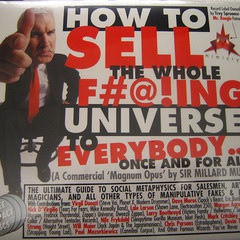When I started Quiet Light Brokerage in October of 2006, I had no idea that almost 8 years later I’d be looking back on over 500 deals closed and nearly $100 million in total transactions. We’ve been fortunate to have a lot of success over the years, but that success has come with a lot of lessons learned along the way.
I often get asked what advice I would give someone who is looking to sell their website. Below are 19 (somewhat random) lessons that I’ve learned about selling websites:
1. Own the Ugly Parts of Your Business
 Image credit: light_seeker on Flickr
Image credit: light_seeker on FlickrIf you are hoping to sell your website, it’s easy to shy away from the ugly parts of your business: the weaknesses, the threats, the disadvantages. Every business has its rough parts. Don’t be afraid to present them to buyers – in fact, you need to own them. Being upfront about your website’s weak points will build trust AND make those ugly parts less scary for buyers.
Lesson: Don’t be afraid of the weaknesses and threats to your business. Present them as they are and trust buyers make their own conclusion.
2. Nothing is More Important Than Trust
There may be no lesson more important than this: deals are closed on trust. A buyer may be attracted by your website’s potential, its history, its metrics. But no one will hand you a check if they don’t trust you or your business. Be ready to prove your website’s metrics (financials and all), and always look for areas where you can help your buyer trust you more.
Lesson: Find ways you can build trust with the buyer and take advantage of them. You’ll be glad you did.
3. Keep the Big Goal in Mind: Don’t Sweat the Small Stuff
I find both buyers and sellers can get wrapped up in the heat of negotiations and lose focus on the bigger goal. It can sometimes feel as if you are giving in on every point of negotiation and that you just need a “win” somewhere. Never negotiate for the sake of negotiating. Negotiate with a purpose.
Lesson: Distinguish between things that are important and not important in your deal. Be willing to bend on the less important things and hold your leverage for what really matters.
4. Always Have a Deadline
 photo credit: Alan Cleaver via photopin cc
photo credit: Alan Cleaver via photopin ccThere is nothing more frustrating than feeling as if your buyer is constantly moving the goalposts and expectations of the deal. Setting deadlines works to set expectations with both the buyer and the seller. It is always OK to renegotiate a deadline if you have good reason to do so. But never go into an offer without an agreed upon deadline.
Lesson: Set mutually agreeable expectations early. Deadlines can be renegotiated if need be, but it is hard to set a deadline once the clock is running.
5. Never Buy (or Sell) a Website When You Are Vacationing
 photo credit: Dani Alvarez Cañellas via photopin cc
photo credit: Dani Alvarez Cañellas via photopin ccSeem obvious? Not to everyone. It’s surprising how many people have vacations planned, house moves, weddings, etc. right around the same time as a planned close. Being available during the 1-2 months of due diligence and the transition period is crucial. Transitioning a business is a sensitive, and often time-consuming time – you need to be available to react should any hiccups arise.
Lesson: Keep your schedule open when transitioning business ownership.
6. Bidding Wars are Rare (and Often Pointless)
The idea of getting buyers into a bidding war for your website may seem exciting, and you might think you would stand to benefit (and sometimes you do). The truth is, bidding wars need to be carefully managed. Poorly managed bidding wars often result in broken offers and a price lower than you would have received if the business was properly priced. Also, buyers who experience a stressful bidding war often go into due diligence with a level of frustration.
Lesson: Don’t count on a bidding war to maximize your price. Price properly from the beginning.
7. Never Lie to Induce a Buyer to Make an Offer
 photo credit: Express Monorail via photopin cc
photo credit: Express Monorail via photopin ccIt can be tempting to tell a little white lie in order to gain leverage in a negotiation (eg. “I have another buyer who is really close to putting in an offer”). It may seem like a good tactic, and it may even work from time to time. But the potential damage this does far outweighs the good. And as I already stated, nothing is more important than trust.
Lesson: Using natural points of leverage is smart. Manufacturing points of leverage through dishonesty is dangerous.
8. Overpricing Can Result in Lower Offers
Several years ago we had a client who insisted on a much higher price than we thought was suitable. We hesitatingly agreed. When the offers came in, they were extremely low. Finally our client agreed to try a lower price more in line with what we thought the market would bear. Lowering the price generated higher offers than the overpriced point.
Lesson: The price of your business attracts a certain caliber of buyer. Price appropriately to attract the best buyers and drive to an assured close .
9. If Possible, Meet Face to Face
 photo credit: brandoncripps via photopin cc
photo credit: brandoncripps via photopin ccWhen a buyer and seller meet face to face, the chances of the deal making it to a close are significantly better. Meeting someone in person helps establish trust and allows you to pick up on more subtle cues as to that person’s trustworthiness. In addition, dishonest people will rarely want to meet in person, so this can be another step in determining if you trust your buyer (or seller).
Lesson: Take the time to put a face to the person behind the email and phone calls. Gaining a human touch is a great piece of due diligence.
10. A Quick Offer Doesn’t Mean You Were Priced Too Low
Receiving a quick offer is not all that uncommon. But when a seller sees an offer roll in shortly after their business is listed, sometimes they think that it is because it was listed for too little. The temptation is to then raise the price and relist it. More often than not, a quick offer means you properly priced your business, prepared it well, and have a buyer who knows what they are looking for.
Lesson: How quickly you get an offer isn’t an indication that you are mis-priced.
11. A Detailed Buyer is a Good Buyer
 photo credit: ♔ Georgie R via photopin cc
photo credit: ♔ Georgie R via photopin ccIt can be very frustrating to have a buyer who asks for a mountain of information in due diligence. But when we think about the big picture goal, a detailed buyer is a good buyer to have. Detailed buyers are more likely to make good decisions and less likely to claim misrepresentation on your part for something they simply missed.
Lesson: Don’t be afraid of big due diligence checklists or detailed buyers. Encourage your buyers to do their research.
12. Like it or Not, Your Financials Are Your Most Important Metric
 photo credit: Philippe Put via photopin cc
photo credit: Philippe Put via photopin ccWant to sell a site for a million dollars? You’ll most likely need a site that has profits greater than $350,000 in today’s market. Sure, there are cases where a strategic acquisition can potentially net more for your business, but these are lower probability sales. Most sellers will be destined to sell to the broader marketplace.
Lesson: Focus on keeping your business lean and profitable for potential buyers.
13. Attorneys and Accountants Can Be Deal Killers
 photo credit: rkrichardson via photopin cc
photo credit: rkrichardson via photopin ccMany seller’s and buyers employ the use of an attorney or an accountant throughout their deal. While this is understandable, keep in mind that an attorney is paid – by the hour – to look for the scary monsters hiding in the dark places of your deal. Remember that your attorney works for you and that you are the boss. Evaluate your attorney’s feedback and make your own decision.
Lesson: Always remember you are the decision maker. Attorney’s and accountants give advice and you make the decisions.
14. Don’t Bother Asking “Why Are You Selling?”
Nearly every buyer asks this, and we ask this of our clients as well: “Why are you selling now?” It is a naturally curious question, especially if the business is very strong. What I’ve learned over the years is that sellers have their own reasons for selling which may not make sense. It could be boredom, a new opportunity, ignorance, burnout, health reasons, money reasons, or anything else. Ultimately if the person selling is doing so because something bad is coming up, they won’t tell you. If the reason is completely benign, you probably won’t understand anyway.
Lesson: Don’t pay attention to the “why”. Focus on the merits of the business itself.
15. Accounting Methods Make a Difference in Price
 photo credit: jeff_golden via photopin cc
photo credit: jeff_golden via photopin ccDo you record your finances using accrual based accounting or cash based accounting? Do you even know what the difference is? Get to know each method, then choose the method that works best for you. It will make a difference in your price (Hint: if you are an e-commerce business and carry inventory, always choose accrual).
Lesson: Learn the difference between accrual basis and cash basis accounting. Determine which is best for your business.
16. Learn How to Allocate the Purchase Price
 photo credit: Viewminder via photopin cc
photo credit: Viewminder via photopin ccFor any sizeable deal, both the seller and buyer need to agree to allocate the purchase price to different parts of the deal. How you allocate the purchase price can have significant tax advantages or disadvantages. As such, learn how to allocate the purchase price to minimize your tax burden.
Lesson: Don’t just think about how much you will get from your sale. Think about the tax consequences as well.
17. The Marketplace Is Always Skeptical
 photo credit: Viewminder via photopin cc
photo credit: Viewminder via photopin ccThe marketplace is inherently skeptical of your business. Because of this, the marketplace punishes sites that are struggling and the marketplace is hesitant to reward sites that are doing well. Understand that when you sell your business, your primary job is to disarm buyers of their skepticism and to prove why your business is valuable.
Lesson: Don’t get discouraged by skeptical buyers. It is the nature of the marketplace. Always be ready to prove your business’s value.
18. Potential is an Overused Word by Sellers
 photo credit: Ibrahim Asad’s PHotography via photopin cc
photo credit: Ibrahim Asad’s PHotography via photopin ccIf you find yourself saying “If only someone were to buy this business and _______” (fill in the blank with: market it, inject more funds, tie it into a bigger network, etc), stop what you are doing and refocus. Every seller talks about potential, but few talk about risk or reality. Most buyers are motivated by understanding the risk of your site as well as its actual performance.
Lesson: Let your business’s potential be implied. Focus on what you have proven first, then focus on areas that a buyer may find “risky”.
19. Preparation Pays Dividends
 photo credit: marilyn_cvitanic via photopin cc
photo credit: marilyn_cvitanic via photopin ccWhen you make that decision to sell your business it can be easy to rush headlong into your sale without preparing the necessary information. Well-prepared businesses, however, sell faster and for more money as buyers are able to more easily determine risk and potential. If you find yourself scrambling to create reports or request documents, you may lose your buyer’s interest and and trust.
Lesson: Always take the time to prepare necessary documents and relevant reports before listing your business for sale.
A Final Bonus Lesson
These 19 lessons certainly don’t make up the entirety of lessons we’ve learned, which leads me to a final, bonus lesson: never assume that lessons learned are lessons forever. The landscape of website acquisitions is constantly changing, and with that the rules morph and transform. After 500+ closed deals and tens of thousands of conversations with buyers, I still find myself learning how to be more effective.
Have you sold a significant website? What lessons would you tell someone who is selling their first website?
Featured Image: Krasimira Nevenova via Shutterstock










